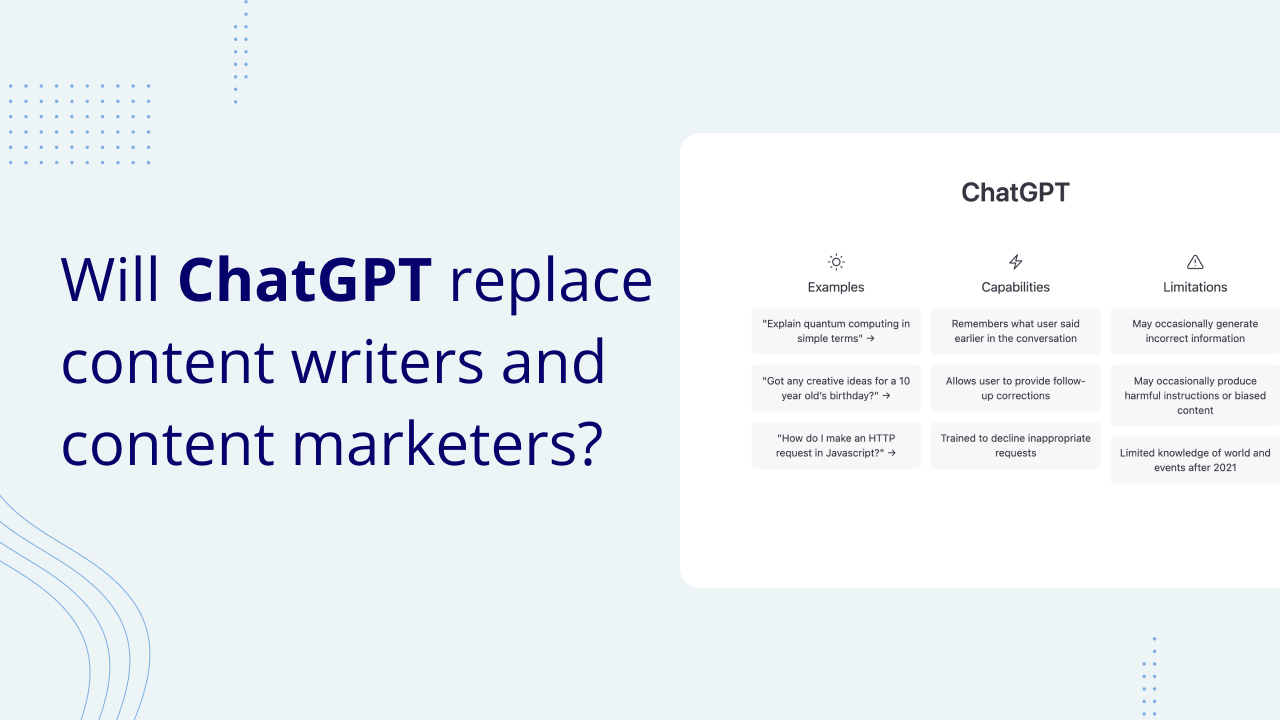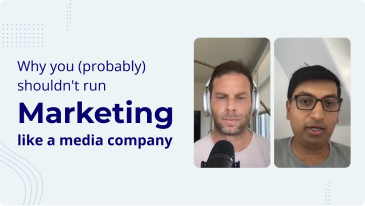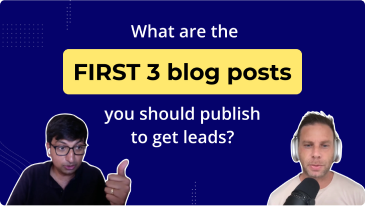Hiring an SEO almost always means one, or a mix, of three options:
- Hiring an individual contractor
- Hiring an in-house SEO manager or building an in-house team
- Hiring an SEO agency
All three of these options have their pros and cons and what’s best for you depends on your situation. However, we noticed that most discussions stop there, with some cliche about “do what’s best for you”, which is obvious and helps no one.
This article is meant to be the antidote to that surface level discussion. Below, we share our experience and opinions of when each type of SEO makes sense for a business to hire. This is based on years of working with dozens of clients as an SEO and content marketing agency and, importantly, working with their internal SEO teams and contractors. Our opinions are also informed by what clients have told us has been their experience with past SEOs they’ve hired and our observations of their work.
Finally, yes, the fact that we’re an SEO agency obviously affects our opinion. We are proud of our process and methodology and the results we’ve achieved for clients, so we feel that we can help tons of businesses achieve real lead growth via SEO, not just hollow traffic.
But we also freely admit that we aren’t the best fit for every SEO need. For example, if you’re already ranking for a lot of buying intent keywords and need someone to maintain and improve 100+ existing URLs, an in-house SEO or technical SEO contractor would be better than hiring us.
So, below we’ll cover:
- Key factors when deciding which hire is best for you
- Questions to ask when hiring an SEO
- Scenarios of when each option makes sense for a business
Agencies vs. Freelancers vs. In-house: Key Factors to Consider When Deciding Which to Choose
Factor #1: Execution of SEO Generally Requires More Than One Person
To have any hope of distinguishing a good SEO hire from a bad one, you need to start with at least a basic understanding of what SEO entails and thus what skills and processes are necessary to “do” SEO.
SEO requires a wide range of different skill sets to be executed successfully. Specifically, it takes some combination of:
- Keyword strategy: Keyword research, identifying valuable keywords, prioritizing the order in which to tackle keywords.
- Content writing: Writing high level content that both ranks and converts traffic to leads or sales.
- Technical SEO: Performing SEO audits and monitoring websites for technical issues, fixing issues that arise.
- Analytics: Setting up systems to track key metrics (i.e. organic traffic, conversions, backlinks, etc.) in Google Analytics, Search Console, Semrush, or Ahrefs, among the other tools you’re using.
- Web development: Making website changes when necessary (such as creating new pages, adjusting the site map, etc).
It’s unrealistic to find a single SEO expert that can do all of these things successfully. For example, when working with our agency, there are often 3 to 5 people with different areas of expertise working together on your account. We have SEO and content strategists, writers, a PPC specialist, a project manager, and a designer ready to deploy for each client. We could not produce the results that we do for our clients without these teams in place.
So, if you’re planning to hire an individual SEO consultant or in-house SEO manager, it’s worth keeping in mind that that person will need to build a team (either through more in-house hires, contractors, or agencies) to execute the full process.
In theory, if you hire an agency that has a team in place to handle the entire SEO process from A to Z (as we do at Grow and Convert), this gives agencies an advantage over individual contractors and single in-house hires. But be careful about the writing step — many agencies tend to outsource content writing to freelance writers in their rolodex, which brings us to the next key factor to consider.
Factor #2: Most SEOs Outsource Content Writing to Freelancers in a Flawed Way
Content writing — specifically, blog content writing — is a crucial aspect of SEO because the core pages of a company’s marketing website (home page, product or service pages, etc.) can only rank for a handful of keywords. To rank for more valuable keywords, you need to produce new, unique content.
To create this content, most SEOs use freelance writers. This in and of itself is not an issue. But the process that SEOs use when working with freelance writers is flawed. We’ve written an entire article about this topic, which you can read here.
In short, there are two common approaches used by SEOs when working with freelance writers:
The first approach is to simply give the writer a topic or keyword, and have them self-research and produce an article on that topic. We call these “Google Research Papers” — where writers do a Google search on the topic and regurgitate what other people are saying. This leads to generic, low-quality content that is unlikely to rank for valuable keywords, let alone convert any readers into actual customers.
The second approach is to provide writers with a “content brief” that is slightly more prescriptive (e.g. providing a light outline of subheadings and topics to cover), but still leaves writers largely to figure out the key arguments to make on a topic by themselves.
In both of these approaches, there are two key issues:
- Lack of product and domain expertise. Neither of these methods for producing content use a process for gaining and expressing product and domain expertise in your content. They produce Google Research Papers, as we said above, that just sound the same as what everyone else is saying. This is a poor reflection on your brand. In particular, if you’re a B2B business where your customers are professionals in their field (Head of IT, HR managers, CMO, etc.) they’ll often know more on a topic than the writer who wrote your content. That’s embarrassing. It also means that for bottom of funnel topics — which we’ve argued ad nauseam are the most impactful — your writers don’t have the knowledge to discuss the details and differentiators of your product and actually convert readers to customers (more on this below).
- High potential for lacking SEO best-practices required to rank. Many freelance writers are not trained in on-page SEO, and may not have the know-how to take an SEO content brief and turn it into an optimized piece that’s capable of actually ranking for a highly competitive keyword.
If you work with an individual consultant or single in-house SEO manager, they’re almost always going to need to work with freelance writers, and therefore, these issues are likely to be a problem unless the person you hire has a more strategic process.
Alternatively, if you work with an agency that has in-house writers and a process for solving these issues (as we do at Grow and Convert), then agencies can be a better option than individual hires.
Factor #3: In-House Teams Take Longer to Get Up and Running
As a final consideration, if you hire an in-house SEO manager, it may take 3-6 months for them to get to know your business, develop a keyword strategy, find and hire freelance writers (a task we’ve found to be very hard), and get content production up and running. Then, there’s the additional time that it takes for your pages and content to rank for keywords in Google; so you might be looking at 12 months before even seeing initial results.
In contrast, good SEO agencies will have processes (and teams) in place to get up and running immediately, speeding up the time it takes to get results from SEO. For example, as shown in our case study on how long it takes to rank in Google, our agency often has 25-35 articles ranking on the first page for high-value, buying-intent keywords in the first 12 months.
Consultants with good systems might have a slight time advantage over an in-house hire. But since they’ll likely need to hire and work with contractors to handle parts of execution, they’re also at a disadvantage when it comes to speed.
For these reasons, agencies will often be the best option from a speed-to-results perspective.
Now, with these factors in mind, let’s look at the key questions (based on our experience) that businesses should ask candidates when hiring someone for SEO.
Questions to Ask When Hiring an SEO
We’ve written at length about factors to consider when choosing an SEO agency, but these factors are relevant when vetting an SEO from any of the categories we’ve been discussing.
Here we’ll touch briefly on these, but read that post for the full context and explanation behind each one of these questions (discussed as “factors” within that post).
Do They Use a Traffic-Focused or Conversion-Focused Keyword Strategy?
In our opinion, this is the #1 most important question because it dictates whether or not your SEO budget generates actual ROI.
Most SEO professionals use traffic-focused keyword strategies with the mindset that with enough traffic, conversions (leads, sales, signups, demos) will follow. But we’ve seen time and time again that more search traffic does not mean more conversions.
Traffic-first SEO strategies might make sense for some businesses (e.g. large incumbents who are already ranking for most of their high-buying-intent keywords), but in our experience, they are a bad fit for companies who want to be efficient with their budget and hit tangible revenue and business goals with their SEO investment (i.e. measurable leads and sales).
Here are two past articles that provide conversion rate data to back up this assertion:
- Pain-Point SEO: How to Produce SEO Content That Drives Conversions
- Scaling Content: Expanding from Bottom of Funnel Content to Top of Funnel (Geekbot Case Study)
And here’s a good article detailing how we approach this at our agency: SEO Keyword Strategy: How to Prioritize Based on Buying Intent to Drive More Conversions
Regardless of who you hire, be sure to ask them what their SEO or content marketing strategy is optimized to achieve. You will see far better ROI if you hire someone that focuses first and foremost on driving conversions.
Which Facet of SEO (Technical, Keyword Strategy & Content, or Link Building) Do They Place the Most Emphasis On?
Through conversations with clients about their experiences working with other SEO services, we’ve learned that many focus the majority of their efforts on on-page search engine optimization, technical SEO, and link building. They spend much less time and effort on what we’ve found to be the most important parts of SEO — identifying high-value keywords and creating pages designed to rank for those keywords.
We think this is backwards.
In our view, technical SEO and link building should only be done in the service of ranking for your highest value keywords. They can help increase domain authority and improve your chances of ranking in top search engine results pages (SERPs), but they cannot generate any actual revenue for your business on their own.
Getting top search engine rankings for valuable keywords (our agency’s #1 priority) is where revenue from SEO comes from.
So, without (1) identifying what your highest value keywords are and (2) strategically creating pages on your site to rank for those keywords, having a technically healthy site with several white hat backlinks does very little for your business.
When hiring an SEO, make sure you get to the bottom of this.
Ask them questions like:
- What tangible results can we expect after 6-12 months?
- When they say something about “rankings” ask for specifics: how many keywords can we rank for? How will we rank for those? Which pages on our site or new pages will you use to rank for those?
- How much weight do they place on technical SEO vs. link building vs. keyword strategy and content? What portion of their time and effort do they spend on each?
If they seem to emphasize technical SEO and link building heavily or as being equally important, this is a red flag and you should think twice about working with them. You’ll be better off hiring someone that uses these to support the main goal of (a) identifying your highest value keywords, and (b) ranking for them with unique, dedicated pages.
Do They Just Do Keyword Research and Provide “Content Briefs”? Or Do They Actually Create New Content to Rank for Your Target Keywords?
Your homepage and existing marketing site can only rank for so much, yet many SEOs and agencies almost exclusively focus on those few site pages to rank for valuable buying keywords. Then they relegate blog content to general top of funnel traffic building. They create a giant keywords list and hand content briefs to writers without worrying too much about those articles. That is a huge waste of SEO resources.
Most businesses have dozens of high-buying-intent keywords available; you can’t possibly get your homepage or a few landing pages to rank for all of them. You need new content tailor-made to rank for all of these keyword variations, and that content needs to be created carefully and strategically.
So, if you’re hiring an agency or outside consultant, be sure to ask them about this. In our opinion, you’ll be much better off going with a service that does both the keyword strategy and the content creation so that they can ensure the content is written carefully enough to rank and convert.
Note:If you’re hiring an in-house SEO manager, this question still applies. Ask them whether they’d do both the keyword strategy and the writing themselves. If their plan is to hire freelance writers to create content, ask what their process would be to ensure writers produce pieces that will properly execute on keyword strategy.
Do They Have Expertise in Product and Service Copywriting?
If you take our point that your priority should be to rank for high-buying-intent keywords, then whoever you hire to do SEO will need to understand how to talk about your products or service in-depth, describe your key features, use cases, and what differentiates your product from competitors.
In order to do this well, they need to have a process for getting this knowledge out of the heads of the experts at your company — your product managers, sales team, customer success team, etc. — and onto the pages they create for you. This is what makes compelling, high-quality content that’s capable of converting readers into customers.
We can say from experience that this is a unique skill set that isn’t easy to come by. Even great writers often lack these key abilities required for selling products and services through content.
When speaking with prospective hires, try to get a sense of whether or not they have a process for expressing your product features and differentiators through content. Ask them about this. Have them show you examples. If their answers and/or examples aren’t compelling, they probably aren’t the right person (or agency) to work with.
At Grow and Convert, since our focus is on ranking for high buying-intent keywords (e.g. “best accounting software”, “concussion clinic in utah”), we sell our client’s products and services in every piece of content we produce. We get into the details of features, explain how they solve customer pain points, weave in testimonials and case studies, and differentiate our client’s products from those of their competitors.
We do this by basing our articles on extensive interviews with people at our clients’ companies — product teams, sales teams, customer support teams, etc. We have been doing this for years and have an extensive training process for writers that has helped us build a tight-knit team of product copywriters.
Read the following past articles to learn more about how we approach this:
- How to Do B2B Content Marketing without Domain Expertise
- SaaS Content Writing: How to Write Content That Gets Leads and Signups
Do They Have Case Studies Demonstrating Their Ability to Drive Actual ROI?
Finally, ask any individual or agency you’re considering hiring to show you proof of their ability to drive business results from SEO. If they have in-depth case studies that show data of the results they’ve achieved for other companies, you can feel much more confident that they’ll be able to achieve results for you, too.
Here are 7 case studies you can read to see how we’ve executed our SEO strategy and met SEO needs for real businesses:
- B2C Content Marketing Example: 0 – 200,000+ Pageviews/Month
- How We Scaled Leadfeeder’s Signups to Over 200/Month
- Scaling Content: Expanding From Bottom of Funnel Content to Top of Funnel (Geekbot Case Study)
- Scaling SEO traffic from 920 to 14,577 Sessions in 6 months (Circuit Case Study)
- How to Do B2B Content Marketing without Domain Expertise (Rainforest QA Case Study)
- How to Create a Keyword Strategy for a New, Innovative Product (Case Study of a Video Editing Software Client)
- Case Study: Applying Pain Point SEO to All-In-One SaaS Products
Then, and this is key, ask for as much detail as possible about how they achieved these results. Don’t be satisfied with surface level case studies like “We grew traffic from 0 to 100,000 pageviews”. Ask about:
- What pages got that traffic?
- Was it from a couple of pages, or many?
- Was unique content created?
- Who created it?
- What keywords did this traffic come from?
- Why are those keywords useful for this business?
- Did you measure leads or conversions? What was the conversion rate?
- And so on.
Scenarios of When Each Option Makes Sense for a Business
Throughout this post, we’ve argued from many different angles that most businesses would benefit from hiring a good SEO agency, rather than an individual consultant or in-house hire.
However, there are cases in which any of these options can make sense.
When Hiring an Individual SEO Consultant Makes Sense
Hiring an individual SEO specialist can make sense for companies that already have a ton of content on their site and are looking to get the best performance out of their pages that have already been created.
For example, an eCommerce website with dozens (or hundreds) of product pages can benefit from an individual contractor that provides ongoing technical maintenance and on-page SEO to ensure their site is well-optimized for driving traffic and conversions through organic search.
When Hiring an In-House SEO Manager Makes Sense
Making an in-house SEO hire can be a great fit for larger companies that are well funded and have the intention to build an in-house team. For example, if you’re a product store or a large SaaS company and you can afford to build an SEO team, this can be worthwhile to pursue.
Alternatively, hiring a single in-house SEO manager that works with and manages contracted writers, for example, can work as long as they’re savvy about the factors we discussed above (i.e. they understand how to hire and work with content writers, how to gain product and domain expertise, they’re good at editing and copywriting, etc).
When Working with an SEO Agency Makes Sense
If you want to have a single point of contact (or a single vendor) that can execute the entire SEO process, then considering an agency makes sense. Another reason to choose an agency is if they have a unique or specific process or methodology that would be useful to your business.
But, as with all options for SEO, vet agencies using the questions above. Just because they are an agency and can do all aspects of SEO, doesn’t mean they do it well, so vetting is important.
Learn More About Our SEO and Content Marketing Agency
- Our Agency: If you want to hire us to execute a content-focused SEO strategy built around generating leads, not just traffic, you can learn more about working with us here.
- Join Our Content Marketing Team: If you’re a content marketer or writer and would love to do content marketing in this way, we’d love to have you apply to join our team.
- Our Content Marketing Course: Individuals looking to learn our agency’s content strategy and become better marketers, consultants, or business owners can join our private course and community, taught via case studies, and presented in both written and video content formats. We include several details and examples not found on this blog. Our course is also built into a community, so people ask questions, start discussions, and share their work in the lesson pages themselves, and we, along with other members, give feedback. Learn more here.








